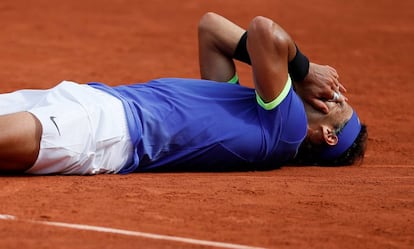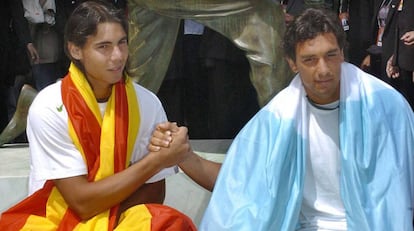Rafa Nadal: the legend that keeps on growing
The Spaniard has never before stormed through a Grand Slam event like he did over the last fortnight
Before Sunday¡¯s French Open final in Paris, there was talk that Swiss tennis player Stanislas ¡°Stan¡± Wawrinka ¨C a man who lived for years in the very long shadow of his compatriot Roger Federer but who, at age 32 is now ranked at number three in the world, and has quietly become one of the game¡¯s heavyweights ¨C might just have the shots, the stamina and the resolve to beat Rafa Nadal.

It wasn¡¯t to be like that. The Mallorcan steamrolled his way through Sunday¡¯s final as he¡¯d raced through the tournament, firing off a string of blistering shots that set Philippe Chatrier court alight. He won in straight sets: 6-2, 6-3- 6-1. Nadal now has 15 Grand Slam titles to his name, 10 of those won in the French capital. His collection is, in the men¡¯s game, second only to that of Federer and partisan fans and critics continue to differ as to who is the Greatest Of All Time.?
Nadal isn¡¯t interested in the scenery from the top: he is the scenery
But tennis is a game of tiny moments, so controlled by internal imbalances that any failed stroke can lead to defeat in a match, a fall into disgrace, a slide down the rankings, or even straight to retirement and a life of penitence. Sometimes rackets are thrown to the ground, they break, and when they are picked up, life goes on. Tennis can also be boring. It rarely gets said publicly but, paradoxically, in this sports of shocks, there is a tremendous amount of routine, and the mechanics of playing are so demanding that sometimes you fall out of love with the racket, or you end up associating it ¨C like retired US tennis star Andr¨¦ Agassi, with a type of hell and a life full of privation, smacking at the ball as if you were hitting your father. There is also something that tennis shares with all collective and individual sports ¨C something that often goes unnoticed ¨C you almost always lose.
Why keep going? The question and the answer were both in evidence on the Roland Garros central court on Sunday as this cannibal of clay won not just his 10th French Open trophy but also, at age 31, notched up an inhuman record which sees him having only lost twice in his life on clay¡¯s promised land. Which means that in tennis you don¡¯t almost always lose: not Nadal and not on clay. Whether attacking or on the defense, Nadal wears down his opponents until they are piles of dust.

The fact that he is mortal is confirmed by his injuries ¨C he has suffered chronic knee and foot problems ¨C as well as by his months of anxiety and his fall in the rankings. What sets him apart from other humans is not that he has come back from a place from which it is almost impossible to return, but that he has come back better than before. And that he has been able to break with the normality of a career that saw him reach the heights at 19 and has deposited him there again just when wreaths were starting to be laid and the old song of ¡°the best Spanish athlete in history¡± was being played as though he had been retired for 20 years.
Tennis is not what it was before Nadal and Roger Federer.
What sets Nadal apart from other mortals is that he has come back better than ever
If Nadal¡¯s reinvention posed a problem, it is now being answered. When you fall after winning everything, it¡¯s only worth climbing up again for the views. In France, however, the Spanish tennis player showed he is interested in everything but enjoying the scenery: he is the scenery. Nadal has never before torn his way through a Grand Slam event like this year¡¯s French Open event. He burned Wawrinka, hammering shots like wooden nails meant to bury his opponent and his shadow rose again on the skyline of Paris, as familiar as the Eiffel Tower. Made of iron. As enduring.
English version by George Mills.
Tu suscripci¨®n se est¨¢ usando en otro dispositivo
?Quieres a?adir otro usuario a tu suscripci¨®n?
Si contin¨²as leyendo en este dispositivo, no se podr¨¢ leer en el otro.
FlechaTu suscripci¨®n se est¨¢ usando en otro dispositivo y solo puedes acceder a EL PA?S desde un dispositivo a la vez.
Si quieres compartir tu cuenta, cambia tu suscripci¨®n a la modalidad Premium, as¨ª podr¨¢s a?adir otro usuario. Cada uno acceder¨¢ con su propia cuenta de email, lo que os permitir¨¢ personalizar vuestra experiencia en EL PA?S.
?Tienes una suscripci¨®n de empresa? Accede aqu¨ª para contratar m¨¢s cuentas.
En el caso de no saber qui¨¦n est¨¢ usando tu cuenta, te recomendamos cambiar tu contrase?a aqu¨ª.
Si decides continuar compartiendo tu cuenta, este mensaje se mostrar¨¢ en tu dispositivo y en el de la otra persona que est¨¢ usando tu cuenta de forma indefinida, afectando a tu experiencia de lectura. Puedes consultar aqu¨ª los t¨¦rminos y condiciones de la suscripci¨®n digital.











































